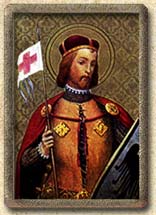|
|
This is the Good King Wenceslas whom the whole world knows from the English Christmas carol. He was a prince of the Přemyslid dynasty whose sensible policy of peace restored calm and order to his country. He himself was renowned for his humility, moderation, love and piety, the result of his upbringing by his grandmother St. Ludmila. He was not only a good statesman, but also a protector of the poor and the sick, whom he helped personally in secret. He founded the church (later cathedral) of St. Vitus in Prague Castle, in which he himself was buried after he had been murdered by his own brother in 935 following a difference of opinion on how to rule the country. His tomb has remained in the same place for over a thousand years. It is part of St. Wenceslas' chapel, which, decorated with semi-precious stones, paintings and gold, is the heart of the present Gothic cathedral. Close to the chapel, behind a door with seven locks, are kept the precious crown jewels of the Bohemian kings. Many miracles took place during his lifetime and still take place today. The centre of Prague, Wenceslas Square, is named after him. Wenceslas (in Czech Václav) is still one of the most popular Czech names. President Václav Havel is one of the many Czechs to have been baptised with this name. The foremost Czech patron saint, the day of his death has become a national holiday since the renewal of democracy. The ancient hymn to St. Wenceslas, one of the oldest preserved Czech hymns, has been sung by Czechs through difficult and joyful times. It is also a prayer. "St. Wenceslas, prince of the Czech lands, Do not allow us or future generations to perish." His legacy: Through moderation and humility we can achieve more than through strength and power. |

